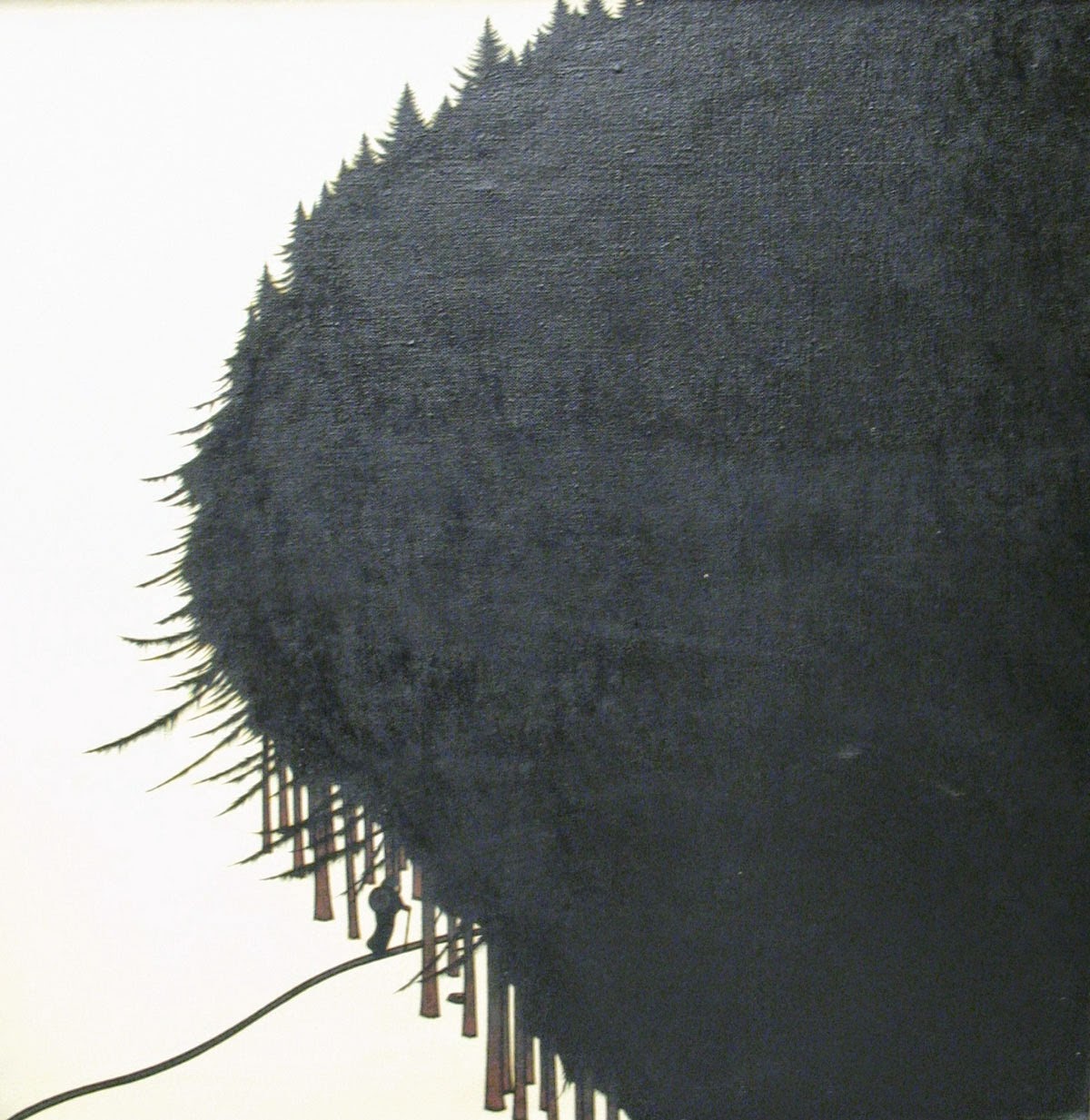 |
| Guy Anderson, "Winter Wheat," oil on board, 24x30, gift of Maude Rueger. |
 |
| Art Hansen, "The Wanderer," 1970, oil on linen, 36x36, gift of Clifford and Patricia Lunneborg. |
 |
| Thomas Mickell Burnham, "The Lewis and Clark Expedition," circa 1850, oil on canvas, 36 1/2 x 48,Haub Family Collection, promised gift of Erivan and Helga Haub. |
There
are works that have been shown at TAM multiple times before, like Gaylen
Hansen’s iconic “Kernal Riding Though Snakes” and William Ivey’s “Blues and
Whites,” and that’s all right because both of those are great paintings worth
viewing again and again. There are also some fabulous pieces I have never
before seen, such as Mark Tobey’s “Northwest Fantasy,” Rick Bartow’s “Old Time
Picture” and Sherry Markovitz’s mind-boggling sculpture of a mounted moose
head, “Eternal Vigilance.”
I
have to admit that I went to this show with less than stellar expectations
because I have an aversion to cowboy art and clichéd, grandiose Western
landscapes, no matter how skillfully executed. But those works by Tobey, Bartow
and Markovitz, plus a few other pleasant surprises, definitely make this show
worth seeing.
The
Tobey, while similar in some ways to his signature work, is in other ways
unlike anything else of his. But then he was a prolific painter, and there may
be many more like this one that I haven’t seen. It has some of the all-over
design and sparkle of his so-called “white painting” but is more luminous with
layers of transparent white washes that flow across the canvas in lyrical
poetry of motion.
Bartow’s
painting is a huge and menacing head painted in a rough, gestural manner that
calls on Native American traditions while displaying drawing with paint
reminiscent of both de Kooning and Basquiat.
Markovitz’s
moose head is made of papier-mache and encrusted with beads, oil paint,
sequins, acrylic paint and fiberglass in homage to both Native American crafts
and the Western tradition of mounting animal-head trophies on the wall.
There
is even some traditional cowboy art with a contemporary twist such as William
Cumming’s “Kay Gee Doc,” a pop-art inspired painting of a cowboy herding a
calf, and Justin Colt Beckman’s video “Gunplay (Screen Test).” In Beckman’s
video an actor practices (or ineptly demonstrates) the art of the fast-draw and
gun-twirl in front of a green screen. It’s like one of Andy Warhol’s films of people
doing nothing or endlessly repeating something, only it’s done with great dry
wit. This cowboy has clearly not mastered the art of gunplay.
Unfortunately,
there is a large charcoal drawing by Paul Harcharik hanging on a panel directly
across from Beckman’s video. It’s a nice drawing but the worst placement
imaginable because it is framed under glass and the bright video reflects in
the surface making it impossible to see the drawing. Someone at TAM, please
swap this piece with another one somewhere else in the gallery.
I
was pleased to see that local favorites Bill Colby and Mary Randlett are both
included in this show. Colby’s watercolor, “Aurora Violet,” is a landscape with
a lower section that looks like Sumi painting and a large and stormy sky above
with a beautiful use of dark violet, blue and gray. Randlett’s photograph, “Emerging
City, Seattle,” is a marvelously nuanced photo of the city skyline emerging
from a hazy sky in beautiful and ghostly tones of gray.
This
show is a precursor to the new wing of the museum to feature the Haub Family Collection
of Western American Art scheduled to open in the fall.
“Northwest
in the West: Exploring Our Roots” Wednesdays–Sundays
10 a.m. to 5 p.m., Third Thursdays 5–8 p.m. through May 25, Tacoma Art Museum, adult $10,
student/military/senior (65+) $8, family $25 (2 adults and up to 4 children
under 18), 5 and younger free, Third
Thursdays free from 5-8 pm., 253.272.4258, www.TacomaArtMuseum.org]

No comments:
Post a Comment